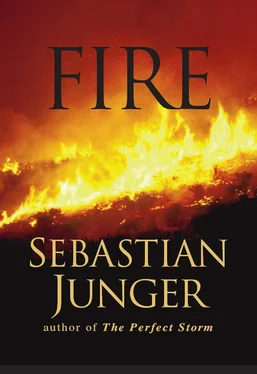The leader of the militant group, Schelly would learn later, was Abdul Hamid Turki, a seasoned guerrilla who had fought the Russians in Afghanistan and was now a field commander for a Pakistan-based separatist group called Harkat-ul Ansar. He ordered all the hostages to sit down at the entrance to one tent. Childs, nervous, looked down at the ground, trying to avoid eye contact with anyone. He was already convinced that the guerrillas were going to kill him, and he was looking for a chance to escape. A cold rain started to fall, and Turki asked for all their passports. The documents were collected, the militants attempted to read the papers upside down, and then they declared that all the Western men would have to come with them to talk to their senior commander. That was a three-hour walk away, in the village of Aru; they would be detained overnight and released in the morning, said the militants. Schelly was to walk to the upper camp with one of her guides.
“After I left, the men [were told] to lie down and pull their jackets over their heads, and that if they looked up, they’d be shot,” says Schelly, who learned these details later from Child’s guide. “The [kidnappers] went through the tents, stealing stuff. And then they took the guys off. By ten o’clock I’d gone to the upper camp and come back down [with the wife and the girlfriend of the Englishmen], and we all piled into one tent because we were still scared. I was awake at four the next morning, and I just kept looking down the trail thinking they’d be coming anytime now. It was six-thirty, and then seven, and then nine; that’s when the knot in my stomach started.”
Finally, Childs’s guide returned. He had a note with him that he had been instructed to give to “the American woman.” It said, “For the American Government only,” and it was a list of twenty-one people the militants wanted released from Indian prisons. The top three were Harkat-ul Ansar.
The kidnapped men walked most of the night. They weren’t being taken to the “senior commander”—he didn’t exist—they were just being led deep into the mountains. The deception reminded John Childs of the tactics the Nazis used to cajole people into the gas chambers, and made him all the more determined to escape. The men walked single file through dark forests of pines and then up past the tree line into the great alpine expanses of the Zanskar Range. It was wild, ungovernable country the Indian Army didn’t even attempt to control, and Childs believed that there was no way anyone was going to save them or even find them. They were on their own.
“I was convinced [the militants] were going to shoot us, and so as soon as I heard someone chamber a round into one of those weapons, I was going to take off into the woods,” says Childs. “At one point we crossed a stream—it was snowmelt season, and the mountain streams were absolutely raging torrents—and I considered jumping in and flushing down to the bottom, but it would have been instant death.”
Childs kept his eyes and ears open and waited. A chemical engineer for an explosives company, he was used to solving problems. This was just another one: how to escape from sixteen men with machine guns. There were personalities, quirks, rifts among his captors he was sure he could exploit. He started lagging while he walked, seeing if he could stretch the line out a little bit; he started taking mental notes of the terrain; he started probing for weaknesses in the group. “Escape is a mental thing,” he says. “Ninety percent is getting yourself prepared to take advantage of an opportunity or create an opportunity. I knew that given enough time, I’d get away.”
Late that night they came upon a family of nomads at a cluster of three log huts. The head of the family stepped out into the darkness to give Turki a hug. Then the militants and hostages all squeezed into the huts and fell into an exhausted sleep. A few hours later, as soon as it was light, Childs sat up and peered through a chink in the wall: alpine barrens and rock, nothing more. Escaping through the forest would have been at least a possibility, but crossing a mile of open meadow would be suicide. He’d be cut down by gunfire in the first twenty steps.
After the hostages were given a quick meal of chapatis, rice, and a local yogurt dish called lassi, they lined up on the trail and started walking again. This would become their routine in the next several days: up at dawn, hike all day, sleep in nomads’ huts at night. The militants bought—or took—whatever food they wanted from the nomads and never had to carry more than a blanket and their guns. They told the hostages that they had been trained in Pakistan, near the town of Gilgit, and had come across the border on foot. They’d been in the mountains for months together and were prepared to die for their cause. When Donald Hutchings tried to engage them in talk about their families, one of the militants just patted his gun and said, “This is my family.”
India and Pakistan have fought three wars over Kashmir, and Turki’s band was the latest permutation in the fifty-year conflict. Harkat-ul Ansar (HUA) is committed to overthrowing Indian (thus, Hindu) rule in Kashmir and absorbing the state into the Islamic Republic of Pakistan. Since 1990 the militancy, as the rebel movement is known, has been waging a sporadic guerrilla campaign against Indian authority with automatic rifles, hand grenades, and other small arms acquired from Pakistan. Turki called the group he commanded Al Faran, a reference to a mountain in Saudi Arabia near where the Islamic prophet Muhammad was born. The first time anyone had ever heard of Al Faran was on July 4, 1995, when they came walking down out of the mountains into Schelly and Hutchings’s camp.
The militants led the hostages by day through snowfields and high passes, traveling north. Childs’s impression was that they were simply marking time in the high country, avoiding the pony trails in the valleys, where they might run into Indian soldiers. As the day wore on, the militants became less worried about being caught, and their vigilance slackened a bit. Turki remained dour and implacable, but the younger ones warmed up to the hostages. They called Don Hutchings chacha, meaning “uncle,” and practiced their high school English whenever they could. Far from being threatening or abusive, they did anything they could to keep the hostages healthy: bandaging their blisters, giving them the best food, making sure they were warm enough at night. Not only did the hostages represent possible freedom for twenty-one separatists rotting in Indian jails, but they were also the only protection Al Faran had from the Indian military. They were a commodity, and they were treated as such.
“It was like a Boy Scout troop with AK-47s,” says Childs. “The youngest militant was sixteen or so, a Kashmiri kid who’d been recruited to the cause. He hadn’t been issued a weapon yet because he hadn’t been through training; he was educated and bright, and his English was good. Turki was dead serious, though, and I didn’t let any kind of camaraderie fool me. If he told them to kill someone, these guys wouldn’t hesitate for a second; they were too well trained.”
By the second day Childs had noticed an interesting—and horrifying—dynamic. The hostages, all desperately scared, turned to one another for comfort and support. They talked about their families, their homes, and their fears. But they had also been thrown into a ruthless kind of competition. They knew that if the militants were forced to prove their intent, they would shoot one of the hostages. That much was clear, but who would it be? An American? A Brit? A weak hiker? A brave man? A coward?
Since the hostages didn’t know the answer, they did the next best thing: They tried to make as little an impression on their captors as possible. They didn’t complain; they didn’t cry; they didn’t do anything that might cause them to be noticed. They blended in as completely as possible and hoped that if the time came to kill people, they’d be invisible to the man with the gun.
Читать дальше












